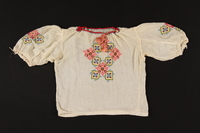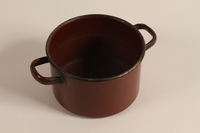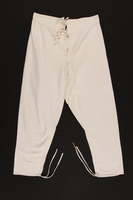Overview
- Brief Narrative
- Ruffled bedcover with straps owned by Chana Matlowsky (later Helen Matlow) and used by her daughter, Fruma (later Fran Matlow), as a baby in Eggenfelden displaced persons camp in Germany, from 1948 to 1949. In September 1939, Germany invaded Poland and gave the Soviet Union the eastern half, where Chana, her parents, Aaron and Dwora, her brother, Moshe, and their extended family lived in Zdzieciol (Dziatlava, Belarus). In summer 1941, Germany invaded eastern Poland. In December, Chana’s brother, Moshe, was sent to work in a forced labor camp in Dworzec (Dvarėts (Hrodzenskaia voblasts', Belarus).) In February 1942, German authorities in Zdzieciol ordered all Jews to move into a partially enclosed ghetto. Chana’s father was killed by the authorities, likely during a selection. In August, Chana and her mother, Dwora, were sent to Dworzec, as forced laborers. In December, Chana, Dwora, and Moshe escaped and hid in the nearby Lipichanski forest, which served as a base of operations for several groups of Jewish partisans. In August 1944, Chana, Dwora, and Moshe returned to Zdzieciol after being liberated by the Soviet Army. Dwora married Hersh Haidukowski, a survivor from Zdzieciol, and in 1945, Chana married Josef Matlowsky (later Joseph Matlow), a survivor from Lida, Poland (Belarus). On January 22, 1948, Fruma, was born to Chana and Josef Matlowsky, while they were living at Eggenfelden DP camp. In 1949, the family immigrated to the United States. Helen’s maternal grandparents, aunt, and cousin are presumed to have perished during the Holocaust.
- Date
-
use:
1948 January-1949 May
- Geography
-
use:
Eggenfelden (Displaced persons camp);
Eggenfelden (Germany)
- Credit Line
- United States Holocaust Memorial Museum Collection, Gift of Helen and Joseph Matlow
- Contributor
-
Original owner:
Helen Matlow
Subject: Fran Matlow
- Biography
-
Chana Minuskin (later Helen Matlow) was born on June 4, 1924, in Zdzieciol, Poland (Dziatlava, Belarus), to a Jewish couple, Aaron and Dwora Medwecki Minuskin (later Dora Haidukowski). Aaron, a taxi driver, was born in 1898, in Zdzieciol. Dwora, a housewife and seamstress, was born on May 1, 1901, in Zdzieciol, to Abraham and Zlata Raswacki Medwecki. In 1923, Aaron and Dwora married. Chana had one brother, Moshe (later Michael), born on March 3, 1926. Of the total population of Zdzieciol, 75 percent were Jewish, approximately 3,500 people. The town was called Zhetl in Yiddish. Chana attended a local Jewish school and knew Yiddish and Hebrew.
On September 1, 1939, Germany invaded Poland. On September 17, Germany handed the eastern half of Poland over to Soviet forces in compliance with the Molotov-Ribbentrop pact. The agreement, in which Germany and the Soviet Union divided Poland, had been signed on August 23, 1939. Fifteen year old Chana began attending a Soviet school. Following the invasion, many Jewish refugees from western and central Poland arrived in Zdzieciol, raising the population by more than 1,000. On June 22, 1941, Germany invaded the Soviet Union and occupied eastern Poland. On June 30, German troops entered Zdzieciol. On July 14, the local military commandant ordered Jews to wear a yellow Star of David badge on the front and back of their clothing at all times. On July 23, 120 members of the Jewish intelligentsia were taken from town to serve as forced laborers. Two days later, the remaining Jews discovered the group had been taken to a forest and killed. In December, likely as part of a group of 400 men selected to construct an aerodrome, Moshe, a carpenter, was transferred nearby to a forced labor camp in Dworzec (Dvarėts (Hrodzenskaia voblasts', Belarus).)
In February 1942, German authorities ordered all Jews in Zdzieciol to leave their homes and move into a partially enclosed ghetto. Special passes were required to leave the ghetto and forced laborers entered and exited under guard. The Germans and their collaborators carried out selections in April and August, selecting thousands of Jews to be shot and buried in mass graves. Chana’s father, Aaron, was killed, likely during one of the selections when healthy workers were pulled aside and shot. In August, Chana and her mother, Dwora, were transferred to Dworzec to serve as civilian forced laborers at the aerodrome. In December, Chana, Dwora, and Moshe escaped from Dworzec. They joined other escaped Jews hiding in the Lipichanski forest, which served as a base of operations for several groups of Jewish partisans and Soviet resistance fighters. In July 1944, the Soviet Army advanced on the region and liberated all those Jews in the forest and the neighboring towns, ghettos and camps. In August, Chana, Dwora, and Moshe returned to Zdzieciol, where Dwora married Hersh Haidukowski (1889 - ?), one of approximately 370 Jewish survivors from their town.
On May 7, 1945, Germany surrendered. In 1945, Chana married Josef Matlowsky, a survivor that had escaped from Radun and Lida ghettos in Poland, before becoming a partisan and Soviet Army soldier following liberation in summer 1944. The couple went to Łódź, Poland. Abraham and Zlata Medwecki, Helen’s maternal grandparents, aunt, and cousin are presumed to have perished during the Holocaust. In May 1946, Josef and Chana went to Funk-Kaserne, a displaced persons camp in the American controlled zone near Munich, Germany. In January 1947, they went to Eggenfelden displaced persons camp. Chana’s mother, brother, and step-father went to Föhrenwald displaced persons camp. On January 22, 1948, Chana and Josef’s daughter, Fruma (Fran), was born in Eggenfelden. On May 29, 1949, Chana, Josef, and Fruma sailed from Bremerhaven, Germany, on the USAT General Holbrook, arriving in Boston, Massachusetts, on June 8. The family boarded a train to Ohio, settled in Cleveland, and changed their names to Helen, Joseph, and Fran Matlow. On December 13, Dwora, Hersh, and Moshe sailed from Bremerhaven, to New York City, New York, on the USAT General Blatchford. Dwora and Moshe changed their names to Dora and Michael. In May 1952, Helen and Joseph’s son, Aaron, was born. Helen’s mother, Dora, and brother, Michael, passed away. Joseph died on October 30, 2015, in Cleveland Heights, Ohio. Helen, 94, died in May 2017, in Beachwood, Ohio.
Physical Details
- Classification
-
Furnishings and Furniture
- Category
-
Household linens
- Object Type
-
Blankets (lcsh)
- Physical Description
- Rectangular white linen bedcover with tie down straps and a rounded, ruffled top. The cover is formed from a piece of cloth folded in half lengthwise and sewn closed along the top and 1 long edge. A wide length of selvedge is sewn into the top seam and gathered into a ruffle with a basting stitch. Four approximately 25.500 inch long, hemmed cloth straps with pointed ends are sewn to the long edges, 2 per side, just below the ruffle ends. At the bottom is a reinforced button placket closure with 3 evenly spaced, circular, clear plastic buttons sewn on the front. The back is longer and there are 3 finished buttonholes along the excess flap of cloth, which is folded over the open bottom edge to line up with the buttons. The flap ends are sewn closed. The hems and seams are machine finished with white thread.
- Dimensions
- overall: Height: 53.625 inches (136.208 cm) | Width: 25.875 inches (65.723 cm)
- Materials
- overall : linen, thread, plastic
Rights & Restrictions
- Conditions on Access
- No restrictions on access
- Conditions on Use
- No restrictions on use
Keywords & Subjects
- Topical Term
- Holocaust survivors--United States--Biography. Holocaust, Jewish (1939-1945)--Poland--Personal narratives. Jews--Persecution--Poland--Biography. Holocaust, Jewish (1939-1945)--Jewish resistance--Personal narratives. Refugee camps--Germany. Refugees, Jewish--Germany.
- Geographic Name
- Eggenfelden (Germany)
- Personal Name
- Matlow, Fran.
Administrative Notes
- Legal Status
- Permanent Collection
- Provenance
- The bed cover was donated to the United States Holocaust Memorial Museum in 2003 by Helen and Joseph Matlow.
- Funding Note
- The cataloging of this artifact has been supported by a grant from the Conference on Jewish Material Claims Against Germany.
- Record last modified:
- 2024-05-30 14:33:54
- This page:
- https://collections.ushmm.org/search/catalog/irn513687
Download & Licensing
In-Person Research
- By Appointment
- Request 21 Days in Advance of Visit
- Plan a Research Visit
- Request to See This Object
Contact Us
Also in Helen and Joseph Matlow family collection
The collection consists of a blanket, cooking pot, shirt, long underwear, and photograph relating to the experiences of Helen and Joseph Matlow and their family before and during the Holocaust in Poland, and afterwards in the Eggenfelden displaced persons camp in Germany.
Date: 1935-1949

Embroidered floral smock worn by a Jewish girl in prewar Poland
Object
Colorful, embroidered peasant blouse given to Chana Minuskin (later Helen Matlow) by her maternal aunt in Zdzieciol, Poland (Dziatlava, Belarus), in 1935. Chana, wearing the blouse, is pictured in a photograph with her aunt, her cousin and her mother, Dwora (2003.193.1), taken in their hometown in 1935. In September 1939, Germany invaded Poland and gave the Soviet Union the eastern half, where Chana, her parents, Aaron and Dwora, her brother, Moshe, and their extended family lived in Zdzieciol. In summer 1941, Germany invaded eastern Poland. In December, Chana’s brother, Moshe, was sent to work in a forced labor camp in Dworzec (Dvarėts (Hrodzenskaia voblasts', Belarus).) In February 1942, German authorities in Zdzieciol ordered all Jews to move into a partially enclosed ghetto. Chana’s father was killed by the authorities, likely during a selection. In August, Chana and her mother, Dwora, were sent to Dworzec, as forced laborers. In December, Chana, Dwora, and Moshe escaped and hid in the nearby Lipichanski forest, which served as a base of operations for several groups of Jewish partisans. In August 1944, Chana, Dwora, and Moshe returned to Zdzieciol after being liberated by the Soviet Army. Dwora married Hersh Haidukowski, a survivor from Zdzieciol, and in 1945, Chana married Josef Matlowsky (later Joseph Matlow), a survivor from Lida, Poland (Belarus). In January 1948, Chana and Josef’s daughter, Fruma (later Fran Matlow), was born at Eggenfelden displaced persons camp. In 1949, the family immigrated to the United States. Helen’s maternal grandparents, aunt, and cousin are presumed to have perished during the Holocaust.

Enameled Dutch oven used by a Jewish family in a displaced persons camp
Object
Red and brown enameled metal Dutch oven used by Chana and Josef Matlowsky (later Helen and Joseph Matlow) while living at Eggenfelden displaced persons camp in Germany, from 1947 to 1949. In September 1939, Germany invaded Poland and gave the Soviet Union the eastern half, where Chana’s family lived in Zdzieciol (Dziatlava, Belarus). In summer 1941, Germany invaded eastern Poland. In December, Chana’s brother was sent to work in a forced labor camp in Dworzec (Dvarėts (Hrodzenskaia voblasts', Belarus).) In 1942, German authorities ordered all Jews to move into a ghetto in Zdzieciol, killed Chana’s father, and sent her and her mother to Dworzec as forced laborers. In December, Chana and her family escaped and hid in the Lipichanski forest. In summer 1944, the Soviet Army liberated the region and Chana’s family returned to Zdzieciol. Following the Soviet occupation of eastern Poland in 1939, Josef’s family left Lida, and went to live with his maternal grandparents in Radun. Following the German occupation in summer 1941, a ghetto was established in Radun. In 1942, German authorities shot one of Josef’s sisters and his grandparents and liquidated the Radun ghetto. Josef’s other sister escaped into the woods, while Josef and his parents were sent to the Lida ghetto, where they were later placed on a transport. In November 1943, Josef escaped and became a partisan. Following liberation in summer 1944, Josef joined the Soviet Army. After the war ended in 1945, Josef and Chana married. In January 1948, their daughter Fruma (later Fran Matlow) was born at Eggenfelden. In 1949, the family immigrated to the United States.

Long underwear worn by a Jewish Polish partisan in the Soviet Army
Object
Long underwear pants worn by Josef Matlowsky (later Joseph Matlow), a Jewish partisan, while fighting in the Soviet Army around Lida, Poland (now Belarus), from 1944 to 1945. The pants, possibly made of fustian, would have been issued as part of a winter uniform. In September 1939, Germany invaded Poland and gave the Soviet Union the eastern half, where Josef, his parents, Rubin and Fruma, and his sisters, Edith, Toby and Michla, lived. Following the invasion, his family went to live in Radun, with Josef’s maternal grandparents, Iude and Lachil. In summer 1941, Germany invaded eastern Poland and established a ghetto in Radun. In January 1942, German authorities shot Josef’s sister, Toby. On May 10, the authorities liquidated the Radun ghetto and shot his grandparents. His family hid in the attic and escaped the ghetto that night. His sister, Michla, fled into the woods, and Josef went to the Lida ghetto with his parents, who were later taken away on a transport. In November 1943, Josef escaped and became a partisan fighter. In summer 1944, Josef joined the Soviet Army after being liberated. In May 1945, Germany surrendered. Josef went to Zdzieciol (Dziatlava, Belarus), where he worked for the Soviet police and married Chana Minuskin (later Helen Matlow), a survivor from that town. In January 1948, their daughter, Fruma, was born at Eggenfelden displaced persons camp. In 1949, they immigrated to the United States. Josef’s sister, Edith, and her family were shot in September 1939, and his parents were killed at Auschwitz concentration camp in 1942.
Matlow family photograph
Document
The photograph was taken in Dzieciol, Poland. Helen Matlow last on left is pictured wearing an embroidered shirt. The others in the photo are Ms. Matlow's mother, aunt, and cousin. Rectangular form; on recto, black and white image of three women and one man standing outdoors in front of building; on verso, handwritten text in ink.



